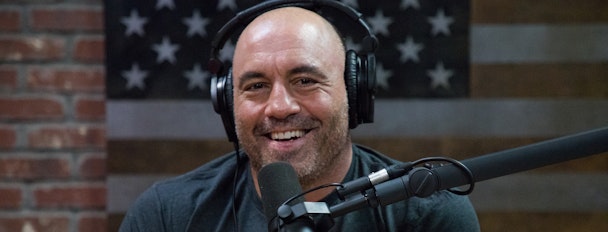‘Pulling ad spend isn’t sensible’: media buyers on Spotify’s Joe Rogan controversy
Spotify’s content moderation policies were called into question this week as artists pulled music from the service over its decision to back podcaster Joe Rogan. With #DeleteSpotify trending, advertisers are now also being put under the spotlight. Media buyers weigh in on the potential fall out.

To what extent are advertisers complicit in funding platform misinformation?
Marketers have faced dilemmas like this before on both Facebook and YouTube, where content policies prompted arguments about the extent to which advertisers were happy to have their brands potentially appear alongside misinformation.
The difference with Spotify is that it commissioned and has the exclusive distribution rights for the content accused of spreading harmful disinformation. Podcaster Joe Rogan signed a $100m a year deal with Spotify back in 2020 and has frequently been accused of less-than-stellar fact checking and deliberately disseminating vaccine disinformation. That deal makes it clear that Spotify has acted as a publisher (whether it calls itself that or not) and so begs the question as to how much advertisers are culpable for paying to appear on the platform.
Musical artists on Spotify – including Neil Young and Joni Mitchell – have publicly asked for their music be removed from the service, specifically citing Rogan as the cause and ensuring that the controversy received widespread attention. Rogan issued an apology, although critics noted he was apologizing to Spotify itself for the issue – not for spreading the misinformation in the first place.
Over the weekend Spotify published its long-held internal rules around how it vets and regulates its stock of podcasts, with its CEO Daniel Ek stating:
“Based on the feedback over the last several weeks, it’s become clear to me that we have an obligation to do more to provide balance and access to widely-accepted information from the medical and scientific communities guiding us through this unprecedented time. These issues are incredibly complex. We’ve heard you – especially those from the medical and scientific communities – and are taking the following steps.”
A Spotify spokesperson confirmed to The Drum that Rogan’s show is a direct buy, so advertisers cannot inadvertently end up against its content. They stated: “Podcast ad buying for select Spotify Originals and Exclusives podcasts is available via Direct in the UK. The Spotify Audience Network is also available to UK advertisers. Podcast ads via Spotify Ad Studio, our self-serve ad channel, is currently only available in the US.“
It all follows internal disquiet at Spotify over its lack of editorial oversight of Joe Rogan in particular. Back in September of 2020, a group of employees sought to limit the extent to which Rogan could book controversial guests and spread information – though based on the news over the weekend, that group ultimately lost the battle.
So with the argument about advertisers inadvertently funding misinformation back on the agenda, what do media buyers believe will be the fallout for Spotify and the brands it partners with?
Policing the internet
While Spotify’s value tanked in the immediate aftermath (though not necessarily solely for reasons related to Joe Rogan), it is the long-term brand damage that potentially could spur further changes in Spotify’s approach.
Robert Passikoff, founder and president of market research firm Brand Keys, says that Spotify will need to take these complaints seriously if it’s to avoid future PR disasters. “One might suppose Spotify thinks this is a version of ’it doesn’t matter what they say about you as long as they spell your name right!’ But as it turns out, it does matter. A lot.“
He adds: “Rogan issues an apology because he’s feeling the financial pinch this kind of publicity brings and Spotify wants to just brush the whole thing under the rug and move on. Not going to happen. The critical word in social networking is ’social’. The brand can set all the parameters and issue all the statements it wants, but it’s the social group – the consumers, the public – who will determine its fate. #DeleteSpotify isn’t what the brand wants out there. Boycotts almost never end well for a brand.“
Its advertisers have also been caught up in the chaos. Brands were quick to boycott Facebook and YouTube over criticisms that they weren’t doing enough to tackle hate speech and misinformation. However, Ben Foster, managing partner, digital at The Kite Factory, said that advertisers should look at the totality of a platform’s content before making a decision on whether to pull spend.
“Advertisers need to ask themselves if they would pause content on other channels and platforms if some of their content was rocked by controversy. Did they pull spend from YouTube and Facebook when they suffered a spate of bad PR? And even if they did at the time, did they stay off those platforms after conversation was no longer headline news?“
Foster continues: “We need to learn that pulling spend from platforms because a tiny percentage of the content doesn’t align to brand values isn’t sensible. Nobody ever considers doing that on Channel 4 after it has aired a controversial program. They are simply careful about avoiding spots around content they deem unsuitable. However, less traditional content platforms are unfairly judged differently and ’cancel culture’ comes to the fore. Brands shouldn’t jump on the bandwagon under the guise of CSR only to creep back a month later.”
Paul Kelly, CRO of A Million Ads, argues that Spotify has an advantage in that respect since this is a flashpoint, whereas its underlying policies work well: "When it comes to major media platforms I'd argue Spotify fares very well when it comes to the prevalence of vaccine misinformation (and other problematic material) relative to almost any other. I'd also argue the story is more a lightning rod because of the economics of the Joe Rogan deal which understandably was a significant development for podcasting but also changed the position of Spotify from passive distributor to producer in this instance.
"Nevertheless, Joe Rogan's content has been consistent pre-dating the Spotify relationship and despite the exclusivity, you still find JRE material frequently posted to YouTube. In my opinion, advertisers should and for the most part do adhere to their policies which includes or reflects the ESG standards of that firm. In many cases that means advertisers will not sponsor or advertise within Joe Rogan much like they may abstain from other creators, subject matter and to a lesser extent, media companies."
Notably, after brands made headlines pulling spend from YouTube in the wake of similar controversies around unsafe ad environments, the vast majority resumed spend on the platform shortly thereafter. It suggests that any such move is a short-term effort aimed at leaning on the platform through publicity, rather than a long-term move.
Nicola Teague is head of AV Planning at The 7 Stars. She says: “The question of whether we should boycott entire advertising platforms or media outlets on the grounds of editorial or content policy is a much bigger one and can be laden with subjectivity and nuance. We saw this just last year when certain advertisers boycotted GBTV, alongside certain social media platforms facing similar challenges.
“Some consumers believe passionately in free speech and some are anti-vaxxers themselves, so from a strategic point of view my recommendation in this instance would vary from client to client. It’s not the sole responsibility of advertisers to hold platforms accountable. Instead, it should be about working collaboratively with suppliers like Spotify to make change alongside them, rather than removing our brands from the conversation completely.“
Rule confusion
Damien Bennett, global director for strategy and growth at Incubeta, believes that Spotify and fellow platforms should not hold up the fact that the majority of their output is generated by users as an excuse to let the ones they commission through: “In the case of the Joe Rogan podcast, the solution is more straightforward as you are dealing with one content creator.
“This is not the case, however, for the thousands of pieces of user-generated content that circulate daily on Twitter, Facebook, Instagram, YouTube and others that spread lies, division and hatred and that platforms quite frankly have failed to clamp down on. In my view the solution has to be that platforms are held to account for what is published on their properties whether it is user generated or not, in the same way a newspaper or television program is.“
It’s a view shared by Karen Freberg, associate professor of strategic communication at University of Louisville, who notes that the division between exclusive content and that created by users is often not obvious: “I think the biggest issue is consistency related to how these platforms handle it. Some accounts are taken off, and others not, and that – along with the misinformation issue – feels to be a big concern and issue in this case.“
She also points out, however, that there have been similar calls for bans and boycotts before, so this is far from a Spotify-centric issue: “There’s been calls to boycott and delete Facebook and other platforms before, so it will be interesting to see how this impacts Spotify in the long run. Rogan and Spotify both came out with statements on this, and I think time will tell on where we go from here.“
Spotify’s value recovered in the immediate aftermath, with brokerage group Citigroup raising the stock rating to ’neutral’. The reason? It believes the Swedish company would be able to improve its advertising business. So it seems that even with the potential brand damage caused by controversial figures on its books, the overall investment in podcasting is paying off for Spotify.
Additional reporting by Kendra Clark.

